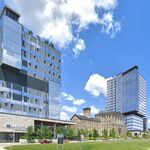Are you trying to imply that Toronto has the highest property tax?
And having a train pass by your little village does not mean you have a decent transit system.
Yes noob, property taxes are the major reason tenants will choose 905 over 416, with rates varying by as much as $14 per square foot. Over the term of a lease, this difference leads to substantial savings for the business, and unless this inequity is addressed, Toronto’s commercial decline will continue. It will become the new bedroom community for the suburban commercial tigers. High commercial property taxes send jobs and development to the 905 region contributing to urban sprawl and works at cross purposes with hub-and-spoke transit, such as GO and TTC, who bring people to and from Union Station (since there is NO job growth downtown anymore).
That is why those little villages are in a better position than most of Toronto right now. Here's more food for thought:
---
Municipal spending is out of control
Kevin Gaudet, Financial Post
http://www.jeffreyteam.com/blog/tor...toronto-has-highest-property-taxes-in-canada/
Even before Toronto announced its latest property tax hikes yesterday, Toronto took the dubious honour for having the highest property taxes in Canada, according to a detailed report issued by the city of Edmonton. Together with Ottawa, Brampton, Hamilton and London, Ontario municipalities take five of the top six spots on the list. This is something most homeowners in these cities know intuitively every time they pay their tax bill. Now they have it confirmed by an objective report that compared more than 30 municipalities across Canada.
Toronto ranked first with the highest taxes paid at $3,912, followed by Brampton at $3,826. Ottawa was third at $3,532; Hamilton and London were fifth and sixth at $3,305 and $3,078 respectively. St. John’s, Newfoundland, deserves credit for taking last place with the lowest average tax at $1,540, and Surrey, BC was second last at $1,814.
This sad but helpful property tax news is timely as city councils across Ontario prepare their budgets. As well, Premier McGuinty’s freeze on assessments for homes expired at the beginning of 2008. Not only will tax rates be going up, but for the first time in a few years homeowners will take a second hit if their home value reassessment shows an increase above the average increase. Assessment changes will take effect for 2009 property tax rates.
What is especially helpful about the Edmonton report is that it compares property taxes in a dollar value instead of as a percentage.
Some mayors, like Toronto’s Mayor Miller, try to defend high property taxes by hiding behind what appears to be a lower rate than other cities. This is hiding because the average value of a home is high in Toronto so the total taxes paid for a Toronto homeowner are higher. When paying taxes one cares less about the rate paid or the details of the complicated formula used. Instead, one cares about how much money is being taken year over year. That is the only comparison relevant to a taxpayer, not whether the rate is 0.82 in one city versus 1.15 in another city.
The main reason for high and growing property taxes in Ontario is that municipal spending is out of control. Municipalities have a spending problem, not a revenue problem. While mayors continue to clamour for more and more money from many sources, their appetites for spending grow unchecked.
Data from Statistics Canada shows that municipal revenue across Ontario has been running at three times the rate of inflation. In 2006 municipal revenue was up 6.3% while inflation was only at 2.0%; in 2005 revenue was up 7.2% and inflation was only 2.2%. Despite Ontario municipal revenues ballooning from higher taxes, more transfers from other levels of government, higher user fees and new taxes in Toronto; mayors continue to complain that they don’t have enough.
It is interesting how mayors can work together cooperatively when it comes to demanding transfers from other levels of government or getting new taxing authority from the province. If that same energy were transferred to creating efficiencies and reducing costs, the report out of Edmonton might show a different – and welcome – conclusion.




